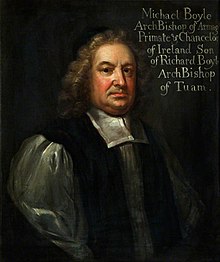Michael Boyle (archbishop of Armagh)
|
The Most Reverend Michael Boyle |
|
|---|---|
| Archbishop of Armagh, Primate of All Ireland | |
 |
|
| See | Armagh |
| Installed | 1679 |
| Term ended | 1702 |
| Predecessor | James Margetson |
| Successor | Narcissus Marsh |
| Other posts |
Dean of Cloyne Bishop of Cork, Cloyne and Ross Archbishop of Dublin |
| Personal details | |
| Born | c. 1609 |
| Died | 10 December 1702 |
| Nationality | Irish |
| Denomination | Church of Ireland |
| Alma mater | Trinity College, Dublin |
Michael Boyle, the younger (c.1609 – 10 December 1702) was a Church of Ireland bishop who served as Archbishop of Dublin from 1663 to 1679 and Archbishop of Armagh from 1679 to his death. He also served as Lord. Chancellor of Ireland, the last time a bishop was appointed to that office.
Boyle was born circa 1609, the eldest son of Michael Boyle the elder. His uncle was Richard Boyle, Archbishop of Tuam. It was through the descendants of his cousin Lieutenant Colonel Richard Boyle that the Boyle name became ennobled over the centuries with multiple peerages, including Earl of Cork, Earl of Orrery and Earl of Shannon.
Boyle was apparently educated at Trinity College, Dublin, where he proceeded M.A., and on 4 November 1637 was incorporated M.A. of Oxford. In 1637 he obtained a rectory in the diocese of Cloyne, received the degree of D.D., and became Dean of Cloyne in 1640. During the war in Ireland acted as chaplain-general to the English army in Munster.
In 1650, the Protestant royalists in Ireland employed Boyle, in conjunction with Sir Robert Sterling and Colonel John Daniel, to negotiate on their behalf with Oliver Cromwell. The Marquess of Ormonde resented the conduct of Boyle in conveying Cromwell's passport to him, which he rejected.
At the Restoration, Boyle became a member of the Privy Council of Ireland, and was appointed Bishop of Cork, Cloyne and Ross. In addition to the episcopal revenues, he continued to receive for a time the profits of six parishes in his diocese, on the ground of being unable to find clergymen for them. For Boyle's services in England in connection with the Irish Act of Settlement 1662, the Irish House of Lords at Dublin ordered a special memorial of thanks to be entered in their journals in 1662. Boyle was translated to Archbishop of Dublin in 1663, and appointed Lord Chancellor of Ireland in 1665. Though the appointment of a cleric as Lord Chancellor had previously been common, Boyle's was the last such appointment and it appears he was offered the position only because no professional lawyer of repute could be found to take it: the aged and ineffective Sir Maurice Eustace had remained in office as Chancellor until his death simply because of the difficulty in finding a suitable replacement. In the event Boyle proved to be a hard working and incorruptible Chancellor, who earned the regard of successive Lord Lieutenants. While he undoubtedly used his influence to advance the career of his son-in-law, Sir William Davys, appointed Lord Chief Justice of Ireland in 1680, such use of patronage was an accepted part of seventeenth-century politics.
...
Wikipedia
